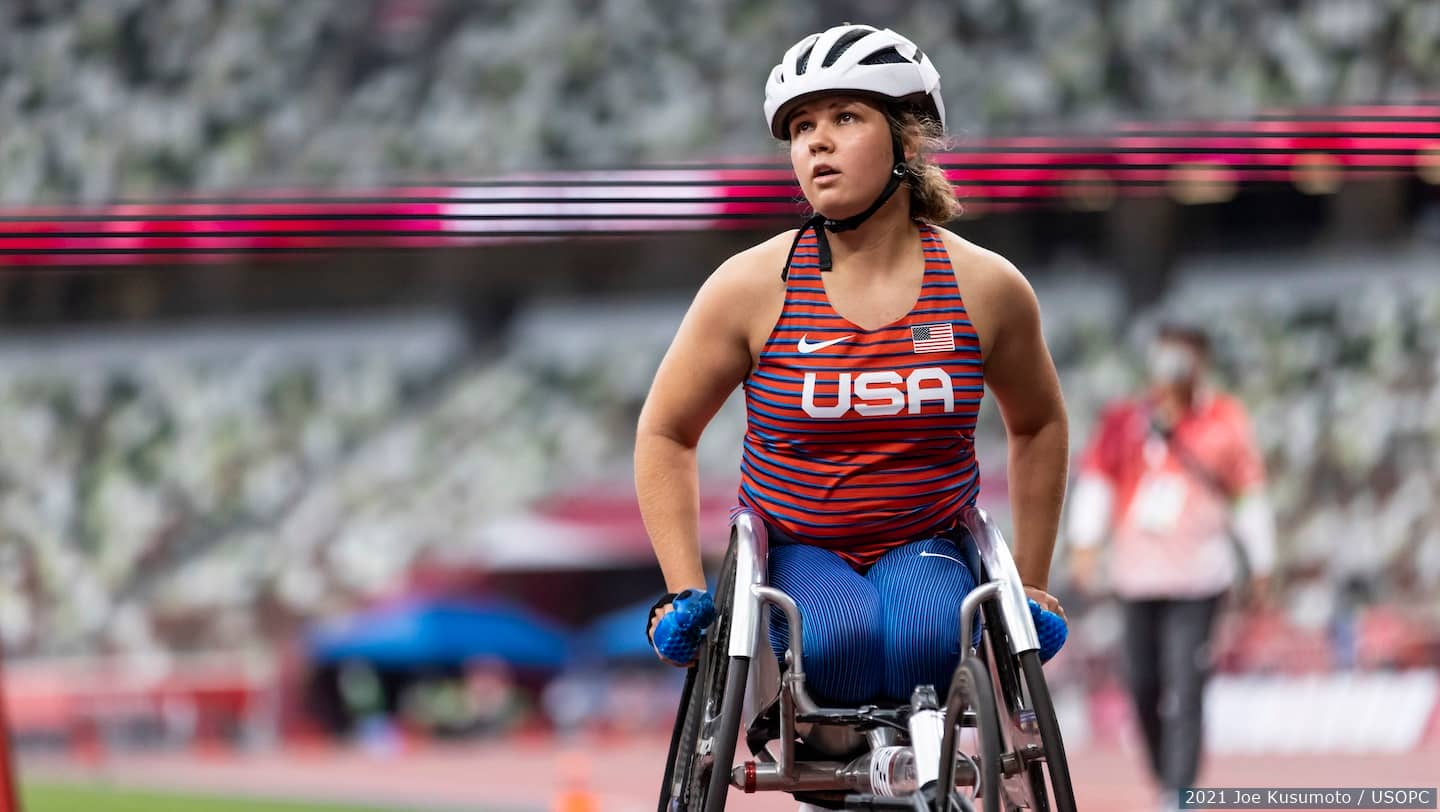
Coach Adam Bleakney: Tokyo Was Full Of Success And Opportunity
by Ryan Wilson

Eva Houston is one of the athletes that coach Adam Bleakney was impressed with in Tokyo. (Photo: Joe Kusumoto)
For wheelchair racing coach Adam Bleakney, the Paralympic Games Tokyo 2020 was a reflection of the continued growth of the Paralympic Movement.
“I felt like our athletes used (the extra year) to their advantage,” he said.
Bleakney watched with pride as 15 of the athletes that came through his storied University of Illinois racing program hit the track in Tokyo. Bleakney was named head coach of the Illinois wheelchair racing team in 2005 after Marty Morse retired. Bleakney since fostered the rapid growth of several of the world’s greatest racers, and he continued racing himself up until the Rio Games in 2016.
While Bleakney, soft spoken yet proud of his team’s performance in Tokyo, finds it hard to pinpoint one great accomplishment from the Games, he was impressed by Susannah Scaroni’s finish in the 5,000. Scaroni has trained under Bleakney for several years.
She pulled off a stunning performance in the race after jumping out to an early lead. It pushed her to her first Paralympic medal, and she set a new Paralympic record (10:52.57), ahead of 20-time medalist Tatyana McFadden, also a U of I alum.
“Susannah’s 5,000 was an incredible performance,” Bleakney said.
Bleakney said he was also impressed by performances from Daniel Romanchuk and youngster Eva Houston. Romanchuk trains with the Illinois racers, and he is quickly gaining a reputation as one of the best racers in the world. The 23-year-old did not medal in the Rio Games, his first Paralympic appearance, but he did not fall short five years later in Japan.
Romanchuk collected gold and bronze in the 400-meter and marathon, respectively.
“To win two medals in that class was quite the accomplishment.” Bleakney said. “The class that he races in is incredibly well developed in terms of evolving the depth of the competition.”
Houston, another up-and-coming racer under Bleakney, is a 20-year-old T34 racer at Illinois. Tokyo was her first Games, and she placed eighth in the 100 and sixth in the 800.
“I thought she did an exceptional job,” her coach said.
Bleakney said the extra year of preparation for Tokyo allowed each athlete to continue working their skillsets. When the pandemic first struck, the team was left practicing in their homes, garages and basements on rollers, and training together over video.
Bleakney’s assistants, Yunus Butt and Joey Peters, recorded at-home workout routines using various things like pans, balls and bands, and shared those recordings with the athletes over email.
The Illinois coach said the limited competition schedule caused him to revisit their training strategy. Some athletes, in fact, had not competed in over a year.
“Without competitions on the schedule, this changes how we were able to train the athletes, and I felt like our athletes took full advantage of the opportunity.”
While the complicated training schedule may have added uncertainty for the athletes, there was an extra incentive on the line in Tokyo. This was the first Paralympic Games in which U.S. medalists received the same payouts as their Olympic counterparts. Paralympians now earned $37,500 for each gold medal, $22,500 for silver and $15,000 for bronze. This decision was announced after the 2018 Games, and all medalists from PyeongChang were retroactively paid more.
This was a 400 percent increase from previous Games.
Still, Bleakney said he does not believe this financial boost affected the athletes’ mindsets.
“I didn’t see that as a catalyst for motivation for the athletes,” he said. “They were equally motivated for previous Games.”
Now with the Games behind them, the athletes are quickly transitioning to an aggressive marathon schedule. The Berlin Marathon was Sept. 26. It was followed by the London Marathon (Oct. 3), Chicago Marathon (Oct. 10) and Boston Marathon (Oct. 11).
Not all of Bleakney’s Paralympic squad is competing in the entire World Marathon Majors circuit. McFadden and Romanchuk are the only athletes scheduled to compete in all six of the major marathons. They won silver in Berlin.
Bleakney stays back in Illinois during most of the marathons, continuing to develop training programs for racers in marathon season and those not.
The racers at least got a couple weeks off, what about their coach?
“I have no break,” he deadpanned.
Ryan Wilson is a writer and independent documentary filmmaker from Champaign, Illinois. He is a freelance contributor to USParaTrackAndField.org on behalf of Red Line Editorial, Inc.